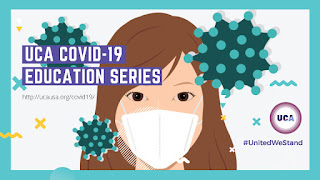24: How to Prevent Aerosol Transmission?
Q: Can the virus spread through aerosol? How to prevent it?
💁Tracy: Yes. Aerosol refers to particulate matter suspended in the air. Aerosol happens mainly in hospitals and confined small spaces, so medical workers have a higher risk factor. Ordinary people are rarely exposed to a large number of aerosols with viruses in daily life, so wearing a mask when going out can play a protective role.
To prevent the spread of aerosols, pay attention to:
💁Tracy: Yes. Aerosol refers to particulate matter suspended in the air. Aerosol happens mainly in hospitals and confined small spaces, so medical workers have a higher risk factor. Ordinary people are rarely exposed to a large number of aerosols with viruses in daily life, so wearing a mask when going out can play a protective role.
To prevent the spread of aerosols, pay attention to:
- Wear masks: When meeting people, go to all public places (supermarkets, buses), wear masks.
- Wash your hands frequently: wash your hands when you come back home, go outside, or after touching any public surface, etc. You need to wash your hands carefully or wipe them with alcohol-based hand sanitizer.
- Toilet disinfection: disinfect toilets, toilet seats, and toilet flush switches at home frequently. Cover the toilet before flushing.
- Ventilation: The flowing air can ease the spread of the virus. But please don't turn on the fan to promote ventilation, because it may cause turbulence and stir the virus particles on the ground into the air.
- Reduce the chance and time of staying in long-term confined spaces (such as elevators, public toilets with poor ventilation). Remember to wear a mask.
- Group buildings: Dormitory, apartment and other group buildings are not easily ventilated. Please keep the windows open and disinfect regularly. If there are multiple vents in the house, please block them.
- Clothing: The amount of aerosol contaminated on clothing is very small, don't worry too much. After clothes are washed and dried, the virus is difficult to survive.
- Outgoing shoes: There may be an opportunity for aerosol transmission. Take them off after going out and place them outside the door. Spray with disinfectant. If there are insoles, spray and disinfect frequently.
- Floor drain: If the floor drain emits odor or a pipe leak is found, please repair it in time. If the floor drain is not used at home, please block it, leaving only the floor drain that has to be used, and ensure that enough water is added daily to prevent the possible spread of virus-containing aerosols under the pipeline.
References
[1] Sabino-Silva R, Jardim A C G, Siqueira W L. Coronavirus COVID-19 impacts to dentistry and potential salivary diagnosis[J]. Clinical Oral Investigations, 2020: 1-3.
[2] Chen C, Zhao B. Makeshift hospitals for COVID-19 patients: where health-care workers and patients need sufficient ventilation for more protection[J]. Journal of Hospital Infection, 2020.
[2] Chen C, Zhao B. Makeshift hospitals for COVID-19 patients: where health-care workers and patients need sufficient ventilation for more protection[J]. Journal of Hospital Infection, 2020.
Writing: Yingde Zhu, Vicki Cheng, Jingyi Xi; Translation: Vivian Fei; Proofreading: Xiao Luo, Suzhen Jiang, Fred F. Guo; Artwork: Sun Liu
Disclaimer and Copyright © 2020 United Chinese Americans







